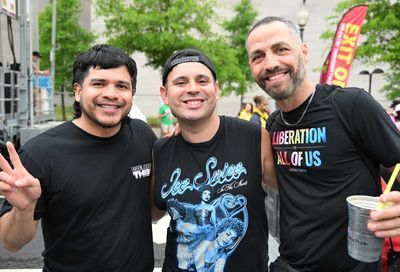Faith leaders supporting trans woman fired by Michigan funeral home
Religious coalition argues that RFRA should not be used as justification for discrimination

A coalition of faith leaders and religious groups has filed an amicus brief supporting a transgender woman from Michigan who is suing her former employer for discriminating against her for wearing women’s clothing in accordance with her gender identity.
Aimee Stephens, an employee of R.G. & G.R. Harris Funeral Homes, was fired in 2013 after she announced she was transitioning. Stephens filed a complaint with the U.S. Equal Employment Opportunity Commission, which found that her civil rights under Title VII had been violated and filed a lawsuit against the funeral home on her behalf.
In response, Thomas Rost, the owner of Harris Funeral Homes, sought an exemption under the federal Religious Freedom Restoration Act, arguing that being forced to keep Stephens on staff would violate his religious liberty and sincerely held religious beliefs opposing transgenderism. A federal court later threw out the lawsuit, forcing a subsequent appeal to the 6th U.S. Circuit Court of Appeals.
As Stephens fights to have her lawsuit restored, Americans United for Separation of Church and State, along with 74 faith leaders and 13 religious and civil rights organizations, has filed a brief with the 6th Circuit arguing that Rost should not be able to cite his beliefs as justification for violating civil rights laws.
Americans United and the coalition of religious leaders argue that RFRA should not be interpreted to give for-profit businesses religious accommodations that harm their employees. Otherwise, they argue, it favors the religious beliefs over the owner at the expense of his employees and violates the First Amendment rights of those who do not hold the same beliefs.
“Were the district court’s decision to stand, for-profit businesses would have broad — indeed, nearly limitless — license to engage in unlawful and invidious discrimination through a simple expedient: describing their discrimination as religiously based,” the brief says. “Employers could prohibit employees from becoming pregnant out of wedlock, refuse to place women in managerial positions, or require employees to wear the symbols of the employer’s religion — and fire those who do not comply.”
Lastly, the religious groups argue, Rost is not being prevented from practicing his religion just because Stephens chooses to live according to her own beliefs.
“RFRA is intended to provide important safeguards for religious exercise; it is not intended — nor should it be allowed — to upend employment antidiscrimination laws,” the Rev. Barry W. Lynn, the executive director of Americans United, said in a statement. “This reading of RFRA would lead to considerable harm to employees and runs afoul of true religious freedom. The district court’s decision should be reversed.”
Support Metro Weekly’s Journalism
These are challenging times for news organizations. And yet it’s crucial we stay active and provide vital resources and information to both our local readers and the world. So won’t you please take a moment and consider supporting Metro Weekly with a membership? For as little as $5 a month, you can help ensure Metro Weekly magazine and MetroWeekly.com remain free, viable resources as we provide the best, most diverse, culturally-resonant LGBTQ coverage in both the D.C. region and around the world. Memberships come with exclusive perks and discounts, your own personal digital delivery of each week’s magazine (and an archive), access to our Member's Lounge when it launches this fall, and exclusive members-only items like Metro Weekly Membership Mugs and Tote Bags! Check out all our membership levels here and please join us today!





























You must be logged in to post a comment.